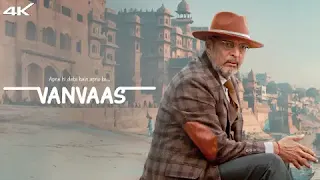Vanavaas (Exile, Hindi; 2025)
Director: Anil Sharma
The aged father, a widower who still resides in the home of his deceased wife, is suffering from worsening dementia. Despite his physical incapacity, he is a proud man with his own ways of doing things and is caustic with his words. He had built a beautiful house and amassed other properties. He lives with his three adult children, their respective wives, and their children.
The father is still determined to be the head of the extended family and makes crucial family decisions. Probably due to their upbringing, the sons remain silent about the father's tantrums and idiosyncrasies. The wives constantly complain about the father's antics, but no one is willing to budge.
So, when the family made a pilgrimage to Varanasi, the six adults decided to lose their father in the crowd. Without his dementia medications, they thought he would not be able to communicate with passers-by and would not return, eventually withering away in oblivion.
For the record, Varanasi offers avenues for end-of-life care. Facilities are available for individuals diagnosed with terminal illnesses to spend their remaining days in the town, where they can be cremated and have their ashes immersed in the Ganga River afterwards. After all, the Kashi-Visvanath temple is believed to be the abode of Lord Shiva. Varanasi is supposed to be Siva's summer residence. The idea of spending one's final days in His presence makes perfect sense.
In true poetic fashion, sympathetic vagabonds from Varanasi eventually bring the father back to his family home. The children had already sold their family home and were liquidating another property.
Scrolling through actual crime cases over the years, I understand that the human mind has no boundaries. It is capable of performing the most profound things and, at the same time, being manipulated or brainwashed into believing the impossible. It is a common occurrence to see how one dominant character can wrap the weaker around his finger to work like an automaton. Case files from the Nuremberg trials, which document the banality of evil, are testimonies to this. In more sedate times, the Stanford Prison Experiment showed that good people can be transformed into perpetrators of evil.













